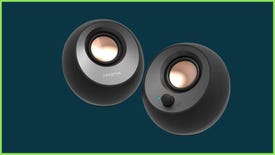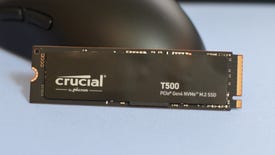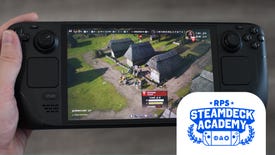-

The kissable frogs and sparky combat of Hades 2 looks set to bewitch fans
Impressions of the "technical test"
-

Whatever the Fallout TV show does with New Vegas lore, Josh Sawyer doesn’t care: “It was never mine”
The Obsidian design director on Pillars of Eternity II burnout and living with dead projects
-

Latest Horizon Forbidden West PC patch finally fixes its weirdest issue
Nvidia Reflex, you’ve bested me for the last time
-

The original Fallout is the perfect antidote to Fallout fever
War did change, actually
-

Lethal Company gets worse as you get better
Why being dumb is good, actually
-

ESA lawyer frets about some sort of terrifying ‘online arcade’ if preservation is made easier
ESA oppose allowing libraries to offer scholars remote access in recent hearing
-
Review: Tales Of Kenzera: Zau review: a beautifully designed yet imprecise platforming adventure
It's not time to make a change
-
First Tales of the Shire trailer reveals a life sim set in Tolkien's most Hobbity pastures
No adventures here, please
-
The Maw - 22nd-27th April 2024
This week's least outwardly offputting game releases, plus our weekly newsblog
Live
Psst! Explore our new "For you" section and get personalised recommendations about what to read.
-

£25 for a pair of speakers sounds great to us
These Creative Pebble V3 speakers are a great choice for rich, clear audio on a budget.
-

Get the fastest PCIe 4.0 SSD for $139 at Amazon
Save over $50 on the Crucial T500.
-

You can get a WD Black SN850X 2TB SSD for as little as £112 but they're selling fast
Save up to £28 on this speedy SSD using the eBay app and a special discount code.
-

The Crucial P3 2TB, one of the fastest 3.0 SSDs, is on sale for just £85
Get a big chunk of storage space for a bargain price.
-

The Don't Starve devs' new cutesy co-cop dungeon crawler is out in early access today
Rotwood allows you and up to three friends to kill a tree
-

You can now pre-register for Genshin developer's Zenless Zone Zero
It's due sometime in the first half of 2024
-

Against The Storm's 1.3 update is out now and it's one for the zoomers
Because you can zoom out further now
-
EGX and MCM Comic Con are sharing a London venue this year
A word from uncle Reedpop, who hasn't sold us off just yet
-
Innkeep satisfies my craving for a fantasy game that's just a grim drudgery simulator
Something need doing?
-
Latest Horizon Forbidden West PC patch finally fixes its weirdest issue
Nvidia Reflex, you’ve bested me for the last time
-
Sweet Transit is a loveable city builder for model train nerds, out of early access now
You choo choo choose me?
-

Supporters only: Piecing It Together gave me a timely little island of calm
Good thing I got my pieces
It's been a while since I snuck my diary into a column, huh?
Long-term readers might have discerned that I haven't been well for a very long time. I have various ailments, of which we all suffer, and it turns out that a mere five years of clinging on by your fingernails sometimes leads to some actual treatment for... all of them. Wild.
So while …
-

Supporters only: What are ‘solvable’ games, and is being solvable a bad thing?
Balatroptimisation
-
Supporters only: An action platformer about getting an eye back from ants affirms my belief that games need a Ronseal approach to their titles
Ants Took My Eyeball is about a man who has had his eyeball taken. By ants.
-
Supporters only: Carpathian Night Starring Bela Lugosi takes Castlevania back to basics
And they call it Bela Notmuche
Get your first month for £1 (normally £3.99) when you buy a Standard Rock Paper Shotgun subscription. Enjoy ad-free browsing, our monthly letter from the editor, and discounts on RPS merch. Your support helps us create more great writing about PC games.
See more information-

Review: Tales Of Kenzera: Zau review: a beautifully designed yet imprecise platforming adventure
It's not time to make a change
-

And the love Kickstarts again
-

Review: Goblin Stone review: turn-based charm spells only last so long
Goblin’ up my patience more like
-

Review: Bore Blasters review: achieve catharsis as a dwarf yelling and shooting mud
Explodey hole
-

The best farming games like Stardew Valley on PC
The cream of the crop
-

A very puzzling collection
-

The 15 best open world games on PC
Keep your options open
-

Review: Botany Manor review: peaceful and beautiful best-in-show plant puzzles
Come away, O human child! To the waters and the wild
-

Arise now, ye Cerim: No Rest for the Wicked’s performance updates are underway
Already running better on low-end GPUs
-

No Rest for the Wicked’s PC performance suggests the wicked might be better off waiting
Got them early access growing pains
-

After six months of renovations, Cities: Skylines 2 performance is considerably less terrible
Some GPUs get more than double the frames since launch
-

Manor Lords performs fine on Steam Deck – it’s the controls you’ll want to watch out for
Contort your thumbs now, my lord
-

Innkeep satisfies my craving for a fantasy game that's just a grim drudgery simulator
Something need doing?
-

Hellish indie horror IRIS can get in the toaster and I’m sure the feeling is mutual
Actively hostile to my attempts to not put it straight in the toaster
-

Cereballers is a free 2D football parody with a spark of real genius
The offside rule is the least of your problems
-

You can play Rising Up in about fifteen minutes, possibly during company time
-

The Don't Starve devs' new cutesy co-cop dungeon crawler is out in early access today
Rotwood allows you and up to three friends to kill a tree
-

You can now pre-register for Genshin developer's Zenless Zone Zero
It's due sometime in the first half of 2024
-

Against The Storm's 1.3 update is out now and it's one for the zoomers
Because you can zoom out further now
-
EGX and MCM Comic Con are sharing a London venue this year
A word from uncle Reedpop, who hasn't sold us off just yet
-
Innkeep satisfies my craving for a fantasy game that's just a grim drudgery simulator
Something need doing?
-
Latest Horizon Forbidden West PC patch finally fixes its weirdest issue
Nvidia Reflex, you’ve bested me for the last time
-
Sweet Transit is a loveable city builder for model train nerds, out of early access now
You choo choo choose me?
-

Here's an archive of previous Wordle words
-

Today's NYT Connections hint and answers (Wed, Apr 24)
Need a hint for today's Connections? Read our guide for help with Connections #318
-

Wordle hint and answer today #1040 (April 24 2024)
Stuck on today's Wordle word for April 24? Read our hint or find the answer below!
-

NYT Connections hint and answers (Tue, Apr 23)
Need a hint for today's Connections? Read our guide for help with Connections #317
-

Wordle hint and answer #1039 (April 23 2024)
Stuck on today's Wordle word for April 23? Read our hint or find the answer below!
-

Whether cop or robber, you'll benefit from the freebies these codes get you
-
No Rest For The Wicked: Where to get a Shovel
Here's how to get a Shovel in the opening area of No Rest For The Wicked
-
Honkai Star Rail codes (April 2024)
Gain Stellar Jade and more rewards with these Honkai: Star Rail codes before they expire!
-
No Rest For The Wicked: Merchant locations
Here's where to find all the Sacrament merchants in No Rest For The Wicked
-
Here's everything you need to know about Runes in No Rest For The Wicked












